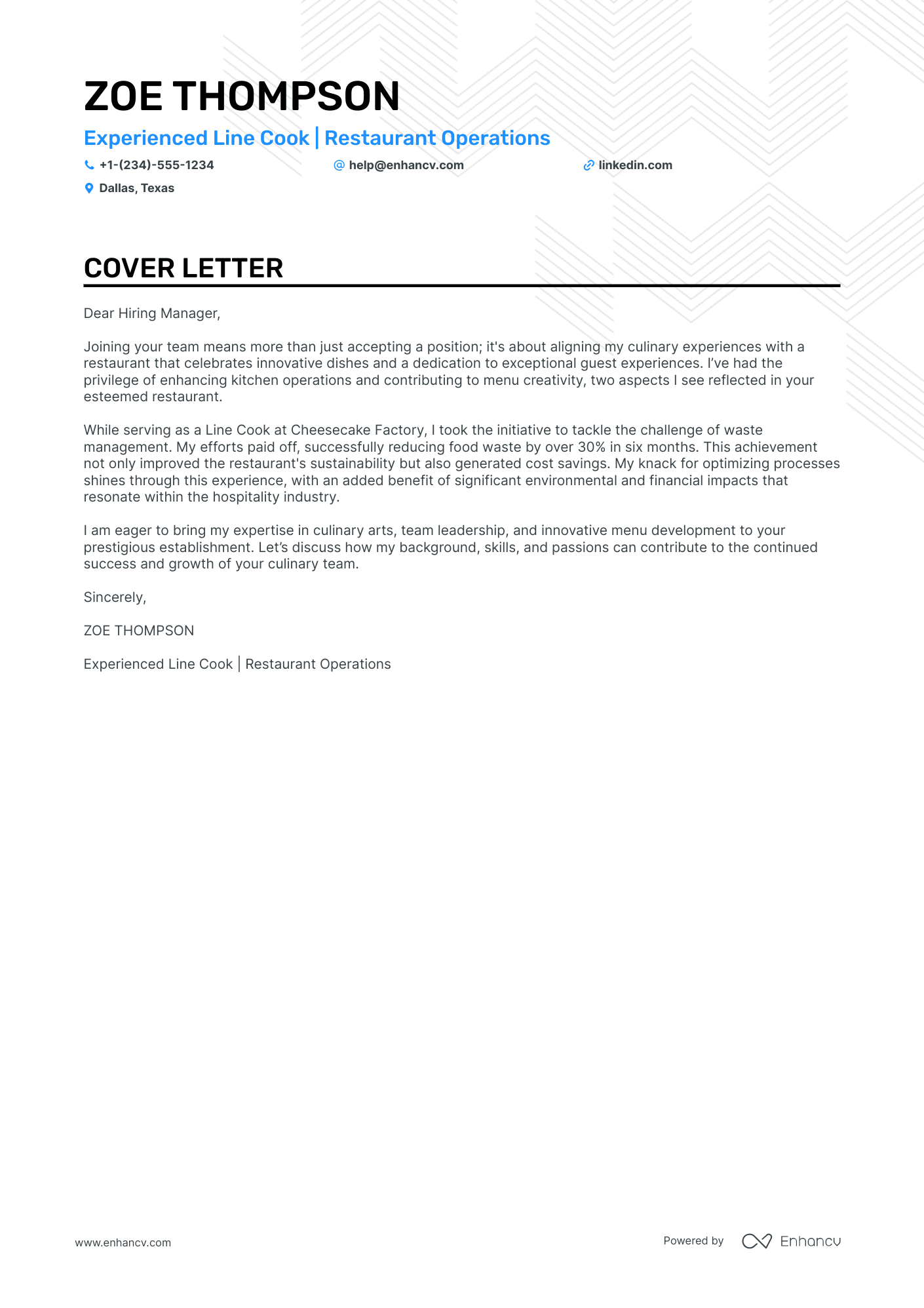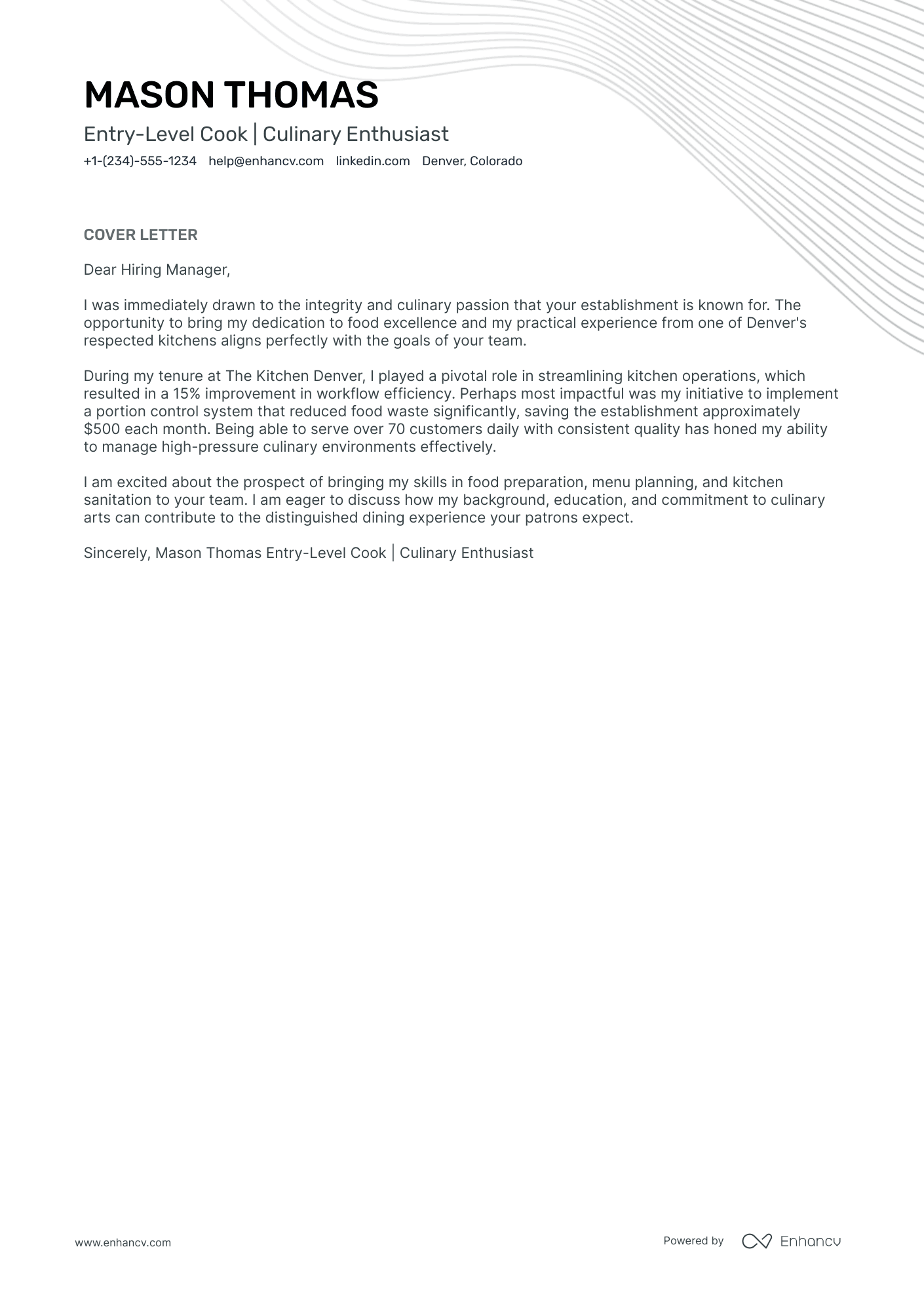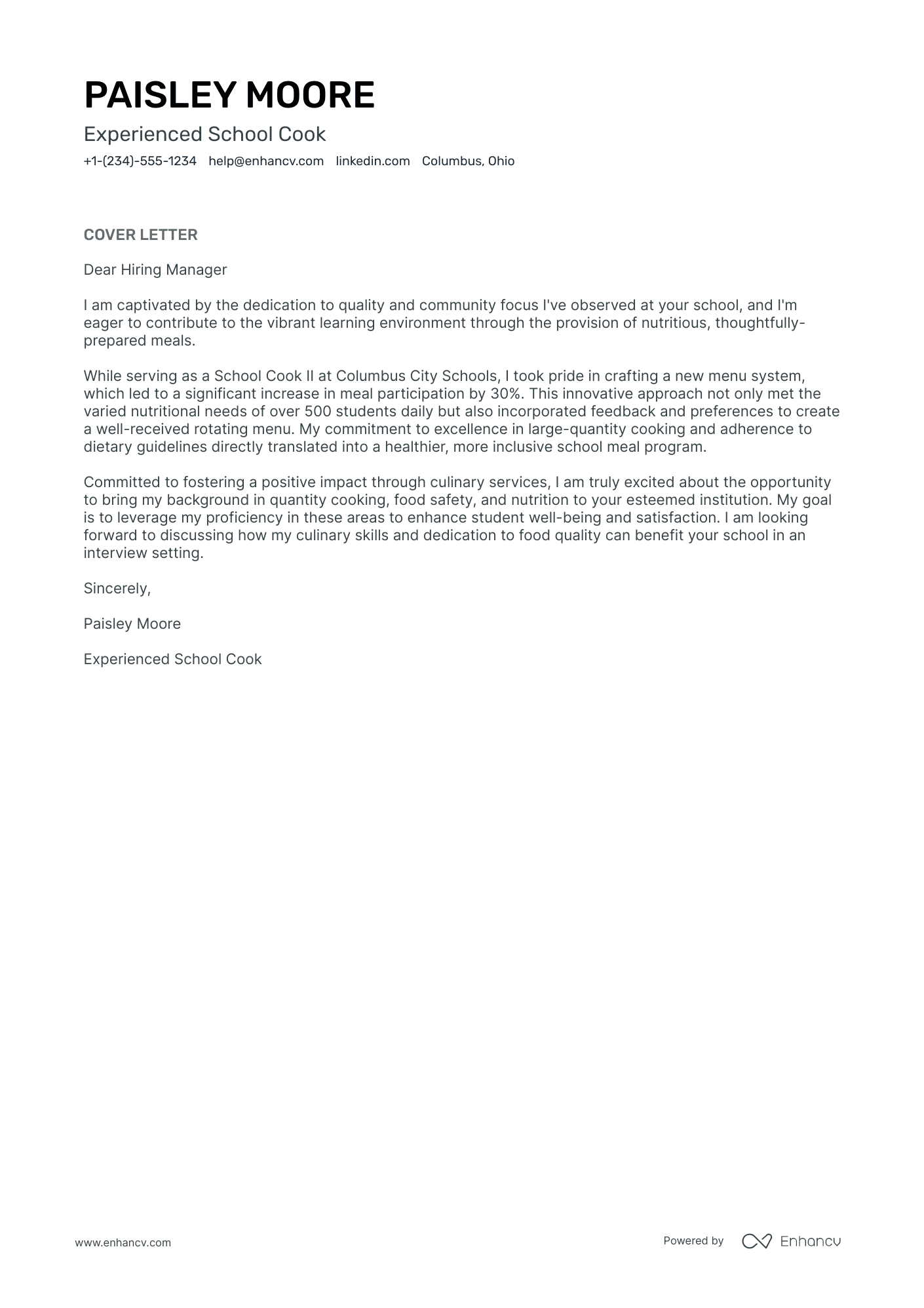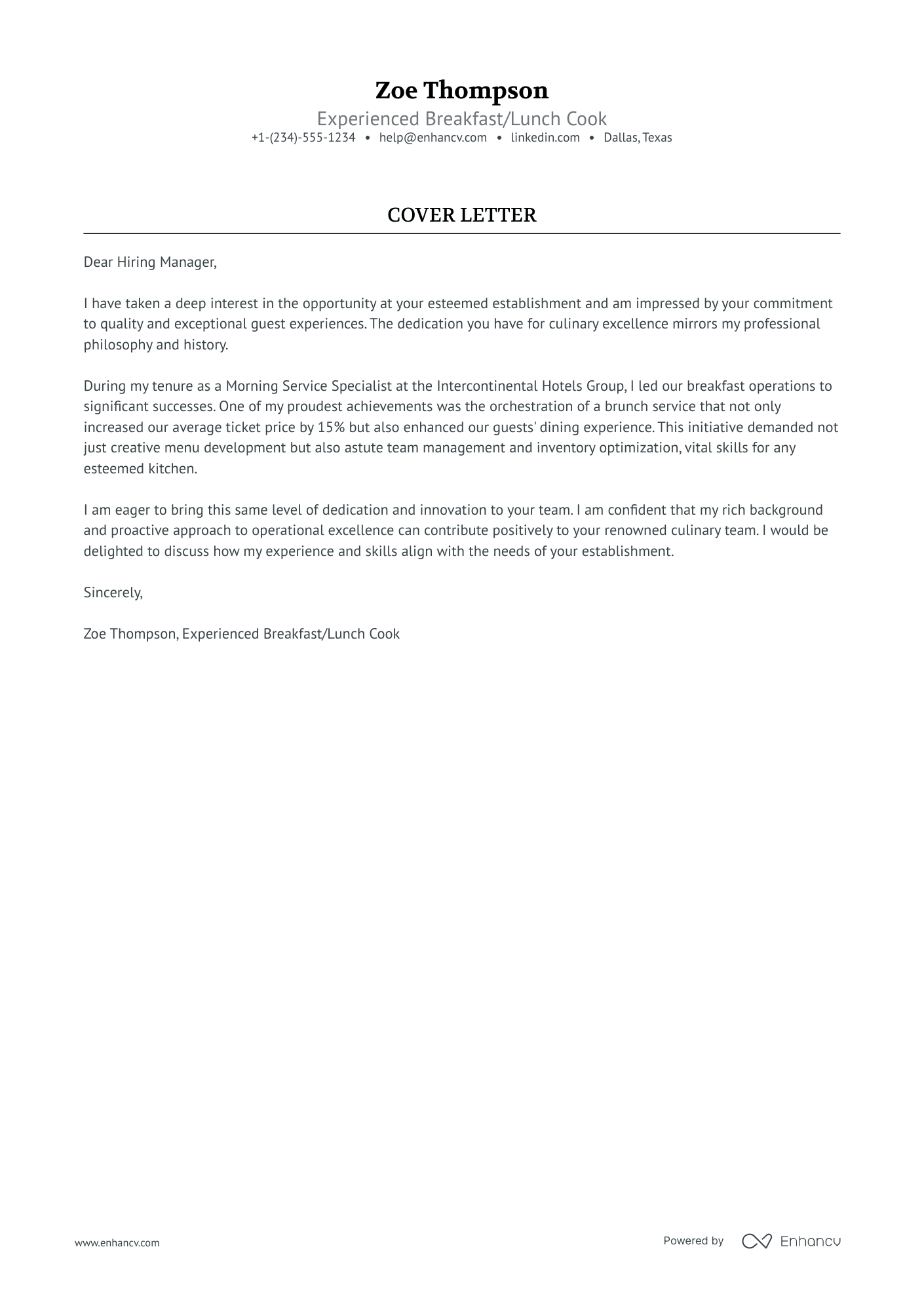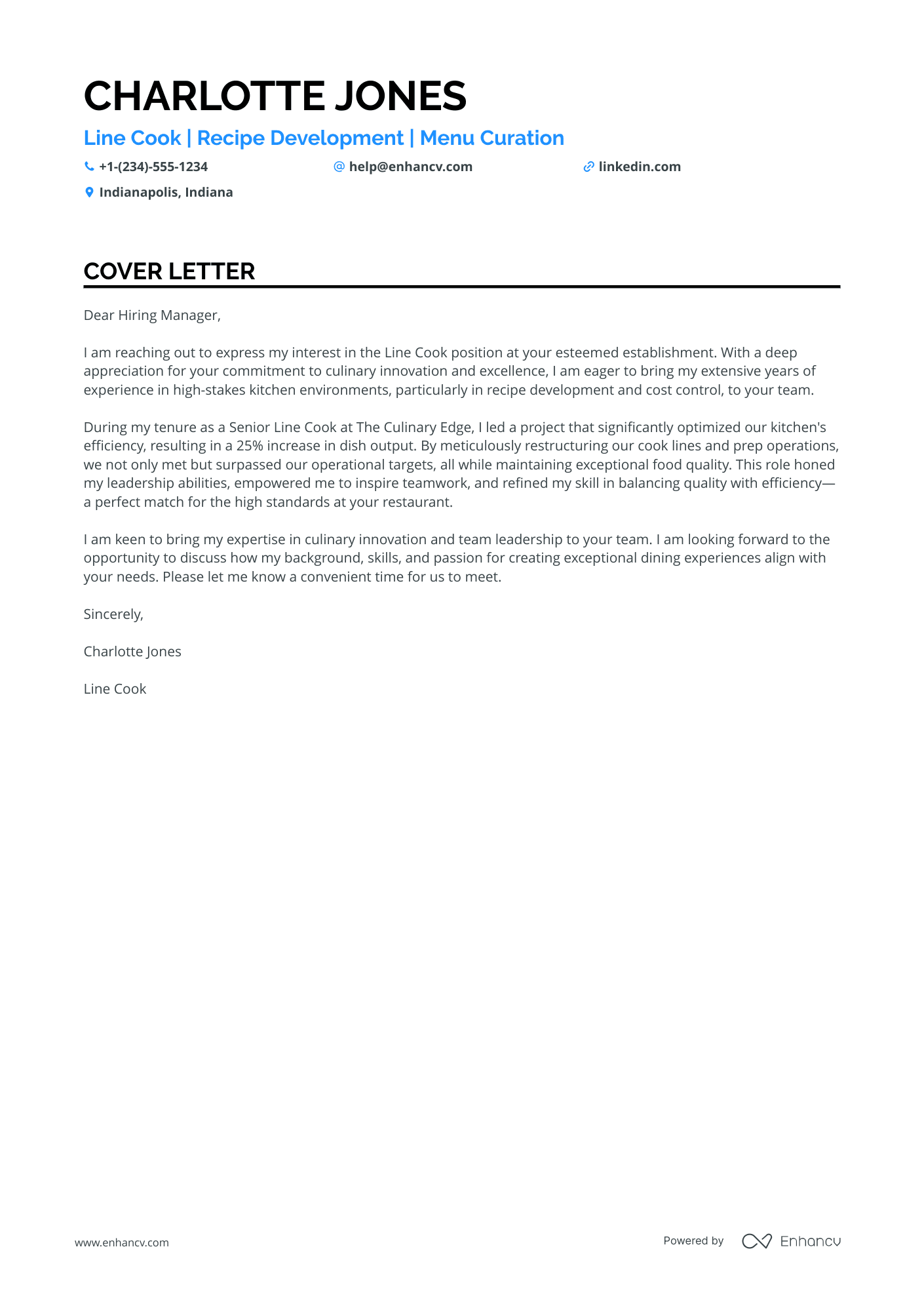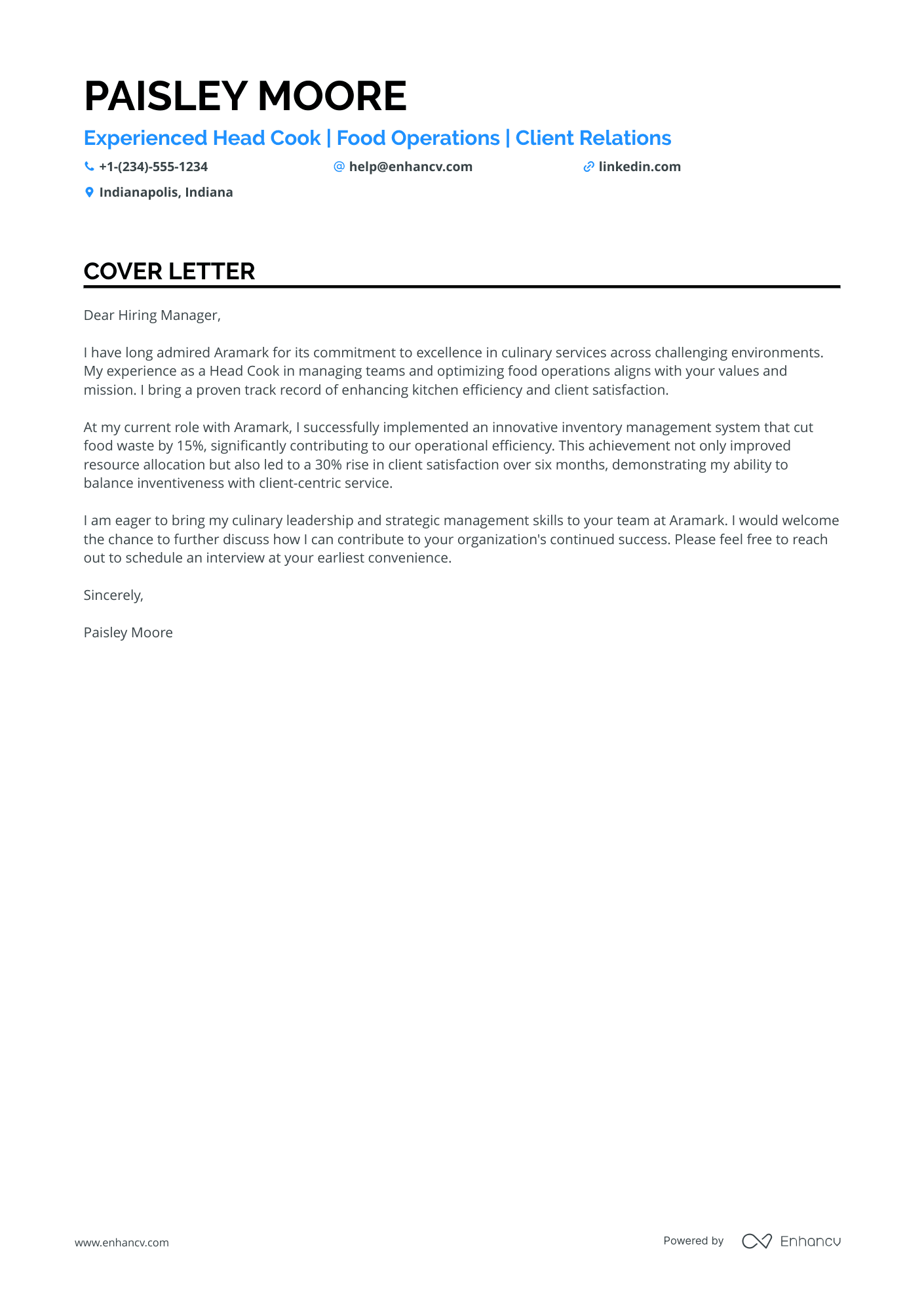You've perfected your resume and you're ready to apply for that cook position, but then you hit a roadblock: the cover letter. It's not just about listing your skills; it's your chance to serve up a flavorful story of your proudest culinary triumph, all on a single, appetizing page. Avoid reheating clichés and let your cover letter sizzle with personal flair, showing employers not just who you are on paper, but the passion and flair you'll bring to their kitchen.
- Writing the essential cook cover letter sections: balancing your professionalism and personality;
- Mixing storytelling, your unique skill set, and your greatest achievement;
- Providing relevant (and interesting) information with your cook cover letter, despite your lack of professional experience;
- Finding the perfect format for your[ cook cover letter, using templates from industry experts.
Leverage the power of Enhancv's AI: upload your resume and our platform will map out how your cook cover letter should look, in mere moments.
If the cook isn't exactly the one you're looking for we have a plethora of cover letter examples for jobs like this one:
Drop your resume here or choose a file.
PDF & DOCX only. Max 2MB file size.
Cook cover letter example
MILA ALLEN
Indianapolis, Indiana
+1-(234)-555-1234
help@enhancv.com
- Emphasizing relevant experience: The cover letter showcases the applicant's direct experience in a leadership role within a kitchen, having managed a menu overhaul and improved customer satisfaction which demonstrates their ability to take on a similar responsibility in the new role.
- Demonstrating quantifiable achievements: By citing specific figures like a 25% increase in customer satisfaction and a 20% reduction in food waste, the applicant provides clear evidence of their success and the positive impact they've had on their previous workplace.
- Aligning with the restaurant's values: The cover letter is tailored to appeal to the hiring manager by showing that the applicant has not only researched the restaurant's commitment to excellence but also has a compatible professional philosophy and has achieved successes in line with the restaurant’s standards.
What are the basics of the design or format of your cook cover letter?
To start, here's a reminder for you: the Applicant Tracker System (or software that is used to assess candidate profiles), won't be reading your cook cover letter.
Recruiters enjoy reading cook cover letters with a standardized format that uses:
- the same font as the resume (e.g. modern ones like Raleway or Volkhov are prefered over the clichéd Times New Roman or Arial);
- single spacing to keep the content concise and organized (this is all ready for you in our cover letter templates);
- a one-inch margin to wrap around the text, like in our cover letter builder;
- PDF as a file format, as it allows your design (and visual element) to stay the same.
Finally, we can't go on without mentioning the key sections of your cook cover letter.
In the top one-third, make sure to include a header (with your contact information, name, role, and date), a salutation, and an introduction.
Next, follows the heart and soul of your cook cover letter or its body.
End your cook cover letter with a closing paragraph and, if you wish, a signature.
Too busy to write your cover letter? Let our free cover letter generator handle it in just a few clicks.
The top sections on a cook cover letter
Header: This should include the cook's full name, contact information, and the date, ensuring that the recruiter knows how to reach them and can reference the application efficiently.
Greeting: A personalized greeting to the hiring manager or head chef shows the cook has researched the restaurant and is serious about joining their culinary team.
Introduction: In this section, the cook should briefly introduce themselves and express their enthusiasm for the position, while highlighting past experiences that make them a great fit for the kitchen's environment.
Body: The body should detail the cook's specific culinary skills, unique cooking techniques, and experiences that align with the restaurant's style, as well as their ability to work as part of a team in a high-pressure kitchen.
Closing: The closing section should reiterate the cook's interest in the role, include a call to action such as a request for an interview, and thank the reader for considering their application, leaving a professional and courteous final impression.
Key qualities recruiters search for in a candidate’s cover letter
- Culinary skills and techniques: Demonstrates the ability to prepare a variety of dishes and understand different cooking methods.
- Experience with kitchen equipment: Familiarity and proficiency with using industry-standard equipment safely and efficiently.
- Creativity and innovation: The ability to develop new recipes and put a unique twist on traditional dishes to surprise and delight customers.
- Time management and multitasking: Essential in a fast-paced kitchen to manage multiple orders and ensure timely delivery of high-quality dishes.
- Attention to detail: Important for consistently presenting well-crafted meals and adhering to specific dietary restrictions or allergen concerns.
- Teamwork and communication: Ability to work collaboratively with the kitchen staff and front-of-house to ensure smooth operation and excellent customer service.
How to greet recruiters in your cook cover letter salutation
As the saying goes, "You never get a second chance to make a first impression."
Write your cook cover letter salutation to be more personalized to the actual hiring manager, who is set to assess your profile by:
- greeting them on a first-name basis, if you have previously communicated with them (e.g. "Dear Sam,");
- using their last name, if you have more formal communication or haven't spoken to them (e.g. "Dear Mr. Harrows" or "Dear Ms. Marshall");
- writing "Dear HR Team" or "Dear Hiring Manager", if you have no clue about who's recruiting for the role.
Search on LinkedIn, Google, or the company website to find information as to the recruiter's name.
In any case, avoid the impersonal "Dear Sir or Madam".
List of salutations you can use
- Dear Hiring Manager,
- Dear [Restaurant Name or Kitchen Team] Manager,
- Dear Chef [Last Name],
- Dear Mr./Ms. [Last Name],
- Dear [First Name] [Last Name],
- Dear Executive Chef,
The cook cover letter introduction: focusing on your unique value, with a creative twist
You are not the only one wondering how to start your cook cover letter. Those first two sentences introduce your profile and should be memorable.
No pressure.
When beginning your cook cover letter, immediately point out the unique value of working with you. In other words, what you promise to bring to the role by using your past track record of success.
Start your cook cover letter with a creative twist by telling a joke or stating something relatable. Select this type of introduction only if it aligns with the company culture.
The middle or body of your cook cover letter body: a great instrument to tell a story
Now that you've set the right tone with the greeting and introduction of your cook cover letter, it's time to get down to business.
Hear us out, the body of your cook cover letter is the best storytelling instrument you have, in your job-hunting arsenal.
Writing the next three to six paragraphs, take the time to reassess the advert to discover job-crucial requirements.
Next, choose one accomplishment that covers those key skills and talents.
Use precisely that achievement to tell an exciting story of how you match the ideal candidate profile.
In the undertones of your story or cook cover letter body, hint at the difference you'd make and sell your application as the perfect one for the job.
Two ideas on how to end the final paragraph of your cook cover letter
Closing your cook cover letter, you want to leave a memorable impression on recruiters, that you're a responsible professional.
End your cover letter with how you envision your growth, as part of the company. Make realistic promises on what you plan to achieve, potentially, in the next six months to a year.
Before your signature, you could also signal hiring managers that you're available for the next steps. Or, a follow-up call, during which you could further clarify your experience or professional value.
Cook cover letter advice for candidates with no experience
If you're worried about writing your Cook cover letter and have no professional experience, we sure have some advice for you.
Turn recruiters' attention to your transferable or relevant skills gained thanks to your life and work experience.
Instead of writing about past jobs, focus on one achievement (whether from your volunteering experience, education, etc.) and the skills it has helped you build.
Alternatively, you could focus your Cook cover letter on your career objectives and goals. Always remember to make those relevant to the job you're applying for by detailing how you see yourself growing as part of the company.
Recruiters would be way more impressed with candidates who fit the job profile and can bring about plenty of skills and vision to the table.
Key takeaways
Writing your cook cover letter has never been easier, so remember to:
- Select a cook cover letter template that automatically meets industry formatting (e.g. has one-inch margins, is single-spaced, is in PDF, etc.);
- Make your cook cover letter personal by mentioning the recruiters' first or last name;
- Within the introduction, describe what you like best about the company in no more than two sentences;
- Use your cook cover letter body to tell a story of your greatest achievement, backed up by job-relevant skills and technologies;
- If you have no professional experience, be honest about it in your cook cover letter, but also write about your unique talents.
Cook cover letter examples
By Experience
Experienced Line Cook
Entry-Level Cook
By Role
School Cook
Breakfast Cook
Line Cook
- Highlighting Relevant Experience: The cover letter emphasizes the candidate's experience as a Senior Line Cook and details specific accomplishments, such as optimizing kitchen efficiency, which directly aligns with the role of a Line Cook.
- Quantifiable Achievements: It includes quantifiable results, like a 25% increase in dish output, showcasing the candidate's ability to produce measurable improvements in kitchen operations.
- Focus on Skills and Leadership: The letter describes key skills like recipe development, cost control, and leadership, important for a senior culinary position, demonstrating the candidate's potential to uphold and enhance quality standards.
- Alignment with Company Values: By expressing a deep appreciation for the company's commitment to culinary innovation, it aligns the personal values and professional goals of the candidate with those of the potential employer.
Head Cook
- Emphasizing a Proven Track Record: Highlighting achievements such as the implementation of an inventory management system that reduced food waste and improved client satisfaction demonstrates effectiveness and results-oriented capabilities.
- Aligning Personal and Company Values: Expressing admiration for the company's commitment to excellence and aligning personal experience with the company's mission strengthens the applicant's fit for the role.
- Quantifiable Success Metrics: Providing specific statistics, like the 15% reduction in food waste and the 30% rise in client satisfaction, offers tangible evidence of success, making claims more convincing and credible to the hiring manager.
- Call to Action for Further Engagement: Encouraging the hiring manager to reach out to schedule an interview demonstrates eagerness and proactiveness, potentially leading to quicker engagement.
